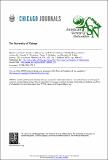Matters of scale : positive allometry and the evolution of male dimorphisms
Abstract
The developmental independence of alternative phenotypes is key to evolutionary theories of phenotypic plasticity and the origins of diversity. Male dimorphisms associated with alternative reproductive tactics are widely cited examples of such facultative expression of divergent fitness optima. Current models for the evolution of male dimorphisms invoke a size-dependent threshold at which the phenotype is reprogrammed. We use predictions derived from allometric modeling to test for the existence of reprogramming thresholds in two species of beetle, Onthophagus taurus and Onthophagus binodis, and the European earwig Forficula auricularia. We also compare the allometry of a number of morphological traits to determine whether minor males suppress their secondary sexual traits. The intercept of the horn allometry was suppressed, but there was no evidence of reprogramming of horn growth in either beetle species. There was reprogramming in the earwig. In the beetles, the horn length in all males can be explained largely in terms of exponential horn growth following an extraordinarily steep power function. The asymptote in O. taurus can be explained by exponential growth meeting the constraint of resource exhaustion. These findings question the currently held view that beetle horn dimorphisms showcase the importance of developmental independence in the evolution of diversity.
Citation
Tomkins , JL , Kotiaho , JS & LeBas , NR 2005 , ' Matters of scale : positive allometry and the evolution of male dimorphisms ' , American Naturalist , vol. 165 , no. 3 , pp. 389-402 . https://doi.org/10.1086/427732
Publication
American Naturalist
Status
Peer reviewed
DOI
10.1086/427732ISSN
0003-0147Type
Journal article
Description
J.L.T. was funded by a Biotechnology and Biological Sciences Research Council research fellowship, J.S.K. by the Academy of Finland, and N.R.L. by a Natural Environment Research Council research fellowship.Collections
Items in the St Andrews Research Repository are protected by copyright, with all rights reserved, unless otherwise indicated.

